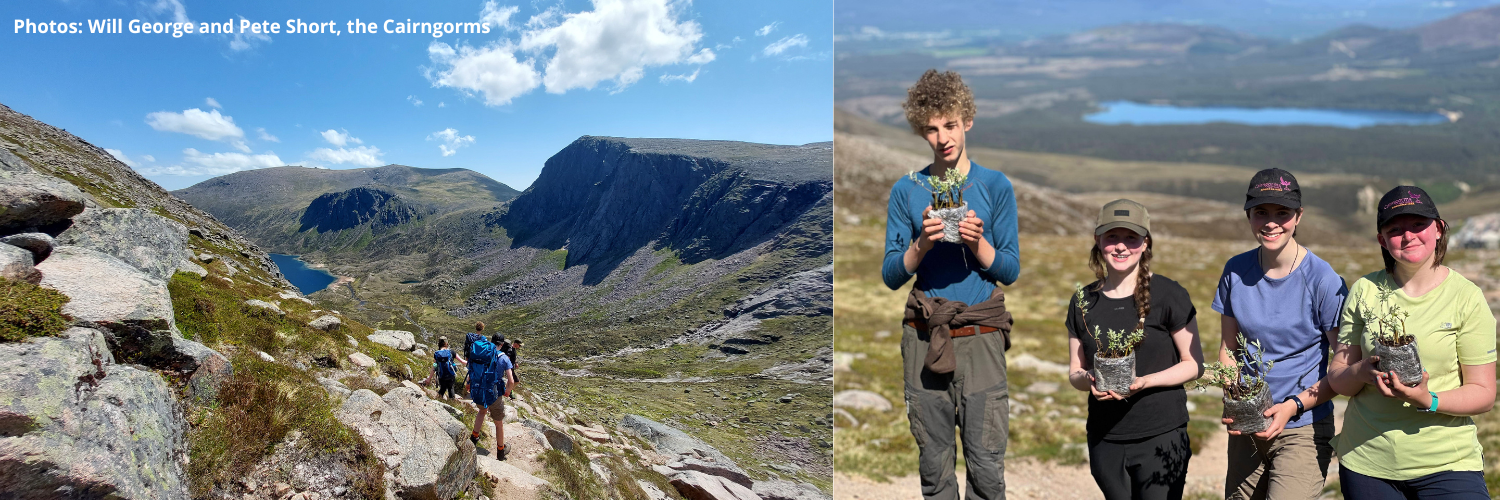Dr Arnold Boer | In Memoriam
With sadness, EUROPARC announces the passing of our friend and colleague, Arnold Boer.
Dr Boer had been involved in coordinating the National Parks system in the Netherlands and brought his quiet but determined diplomatic skills into EUROPARC during turbulent times in the 1980’s. He served on EUROPARC council as Treasurer from 1987 steering calmly the finances and setting the foundation for a more secure future.
It was, however, the Transboundary programme, that became his real passion in EUROPARC. Having been involved since its inception, he oversaw the Basic Standards and Certification that are the foundation for transboundary cooperation across Europe. Chairing the Transboundary Steering and Evaluation Committee (STEC) he brought new Transboundary areas into the network and with the creation of the TransParcNet his gentle guidance ensured meetings were infused with friendship.
He leaves a legacy in our programmes, in our parks and in many hearts across Europe.
A true gentleman, always available with sound advice and wisdom gained from many years of experience. Never without a colourful scarf draped elegantly over his shoulders, his thoughtful, calm presence will be sorely missed by all in EUROPARC.
Our deepest condolences go to Arnold’s Family at this sad time.
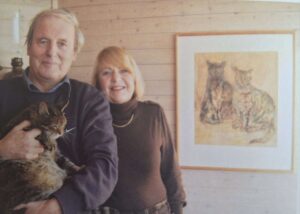
Some words from the Transboundary family
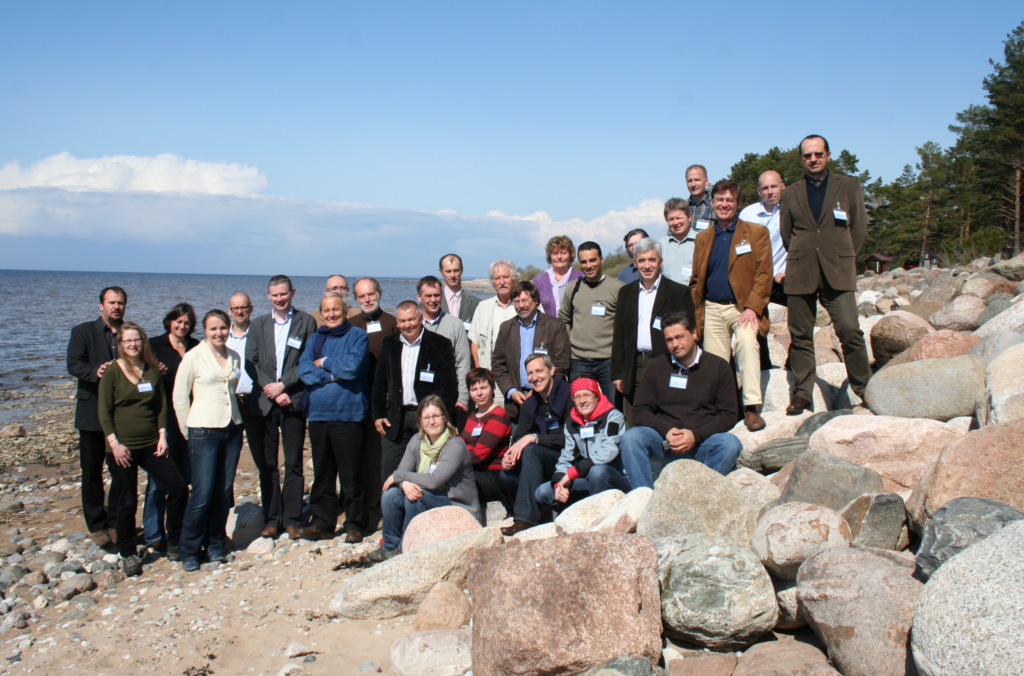
Our warmest thoughts go out to Arnold’s loved ones, when we received the sad news of his passing.
We will always remember Arnold with warmth, his thoughtfulness and calm nature.
His long experience and knowledge about transboundary issues will be missed by all of us in STEC.
Tiia, Handrij and Matti – STEC
Thanks to his passion and expertise he has allowed me to fully understand the meaning and value of transboundary parks.
A person of profound humanity and serenity, always ready for confrontation and dialogue, and also to share moments of leisure and joy.
TB family will miss him.
Stefano Santi – EUROPARC Council member
He lived his life so fully and passionately, followed his beliefs and backed them up with immense intelligence. Always ready for a conversation, which he was able to support with humour. His enthusiasm for a Transboundary and united Europe was beyond measure.
He will be in my thoughts for many reasons today and in the future.
Mojca Smolej – TB Task Force Co-chair
Arnold was the person in the Netherlands responsible as a civil servant from the Dutch government for the implementation of the Dutch scheme for national parks (21).
In the EUROPARC Federation, Arnold was several years treasurer and Initiator together with a colleague from Finland of the transboundary Programme. And until now member of the STEC. In the beginning, Arnold himself was a verifier. And he was always a participant in the TransParcNet Meetings.
Leo Reyrink – TB Task Force Co-chair
You will be able to see the picture album from the TransParcNet meeting in Oulanka National Park in 2019 that Dr Boer was a part of below:
A star dims in our EUROPARC firmament
It is with great sadness that EUROPARC learned of the sudden death of Wilf Fenten this week.
Wilf was a stalwart of EUROPARC having been involved in setting up and serving as Director of EUROPARC consulting which was central in managing the Charter for Sustainable Tourism and developing networking workshops in EUROPARC Atlantic Isles.
A native German, Wilf was an adopted Englishman and even more so, of Yorkshire, where he had been a board member of the Yorkshire Dales National Park as well as a local councillor. His passion for caring for the land, took a practical turn when he managed a small flock of sheep and wildflower meadows at his home in Settle. It was a source of much hilarity to hear of the sheep- adventures of “Angela Merkel“ and “Condoleezza Rice”, as the sheep were named after female world leaders.
A true European, Wilf relished the international connections he helped forge across EUROPARC. Although saddened when EUROPARC Consulting closed, his dedication to the Charter continued, as a member of the evaluation committee, who very much appreciated his long experience, knowledge and attention to detail. He had been too a Trustee of the Dales and Harrogate Tourism Partnership. Wilf’s outgoing and friendly personality served him well bringing many stakeholders together in many Protected Area European projects. These included “training the trainers” programme for the WWF Danube Carpathian and with other Protected Areas on more specialist topics such as “Cultural Heritage and Sustainable Tourism”, “Protected Areas as Testbeds for Sustainable Development” and a “Learning from Europe” project about strengthening the identity and public commitment towards English Protected Landscapes. Many will have been touched by his work and his legacy and achievements across the European Protected Areas community are evident.
Wilf loved his connections and times with EUROPARC. We understand he felt it was the most rewarding part of his life – combining work with his enthusiasm for designated landscapes all over Europe. His company was always a pleasure, you were always greeted with a huge smile and warm hug and was never without a good story from his many travels and connections. He was kind, considerate, consummately positive and emanated joy.
He was a star in our EUROPARC firmament that has sadly now dimmed.
Our deepest condolences go to Hilary and his children and grandchildren.
Complementary EUROPARC Programmes: the European Charter for Sustainable Tourism and the Junior Rangers
Junior Rangers are the future park staff, business owners, tour guides and are important stakeholders in the European Charter for Sustainable Tourism.
Involving young people in the European Charter for Sustainable Tourism
by Rolands Auzins, ECST verifier
I care. I care about what is happening around now and in the future. I am interested. I am interested in how it works, why it happens and whether it can be different. I want to get involved. I want to be a part of the present and the future and be the one who can make things better. I’m a Junior Ranger.
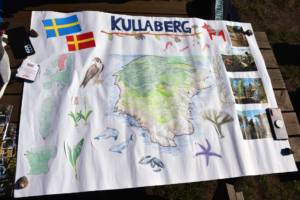
Junior Rangers showcase their Protected Area at the International Junior Ranger Camp
Sustainable Destination principles govern how tourism is developed and managed in a Protected area. The European Charter for Sustainable Tourism in Protected Areas is a management tool, to ensure a viable and healthy future for people and for nature. Let’s pause here at “people” and focus on young people – the Junior Rangers. We for nature, nature for us. It is a mutual interaction between the two EUROPARC programs.
In charter parks, engagement with young people has largely been through the EUROPARC Junior Ranger programme. This programme has been operating effectively for many years and has proven itself to be a quality activity with a clear vision for the future.
Young people are an essential part of society in a Park involved in the ECST; they are stakeholders, and they will later take our place to continue what has been started. Years from now, a former Junior Ranger will come to the Park and say – hey, I’ve been here since I was a teenager, I know you and I know what you do. I want to be part of the team and maybe do even better.
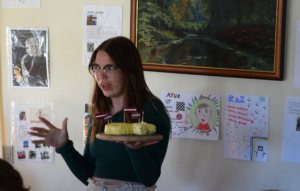
A Junior Ranger introduces others to local Latvian specialities
Young people have a different point of view, they identify their own issues, which are not only worth it, but you definitely need to delve into them, because it is another perspective. Implementation of the ECST program is not possible without the involvement of young people. Junior Ranger activities are an excellent addition to the achievement of ECST’s goals, implementing various projects, activities, and engaging in the creation of a sustainable future. The young person is a Junior Ranger all the time, whether at school, at home, or in everyday life, and when working with ECST tasks, Park staff should remember that there is a young person nearby who is ready and willing to be involved.
How we (those currently in charge of parks and especially ECST Protected Areas) manage Parks now, what decisions we make, affects us now, but will affect young people even more later. Our decisions today mostly have long-term effects, which will be best appreciated by those who do not yet have direct decision-making rights. If a park has become a Sustainable Destination, it is a long-term decision that will ensure the sustainable development of this place in the long-term and will ensure that Junior Rangers will want to return here after studying at universities. Time passes quickly, young people grow up, and they have their own requirements for life, space and place (e.g. as expressed in the EUROPARC Youth Manifesto). With the European Charter for Sustainable Tourism, a solid foundation is laid for the future together with those who now proudly call themselves the Junior Rangers.
Junior Rangers contributing to the European Charter for Sustainable Tourism in the Cairngorms National Park
by Will George, Ranger at the Cairngorms National Park and Junior Ranger Mentor
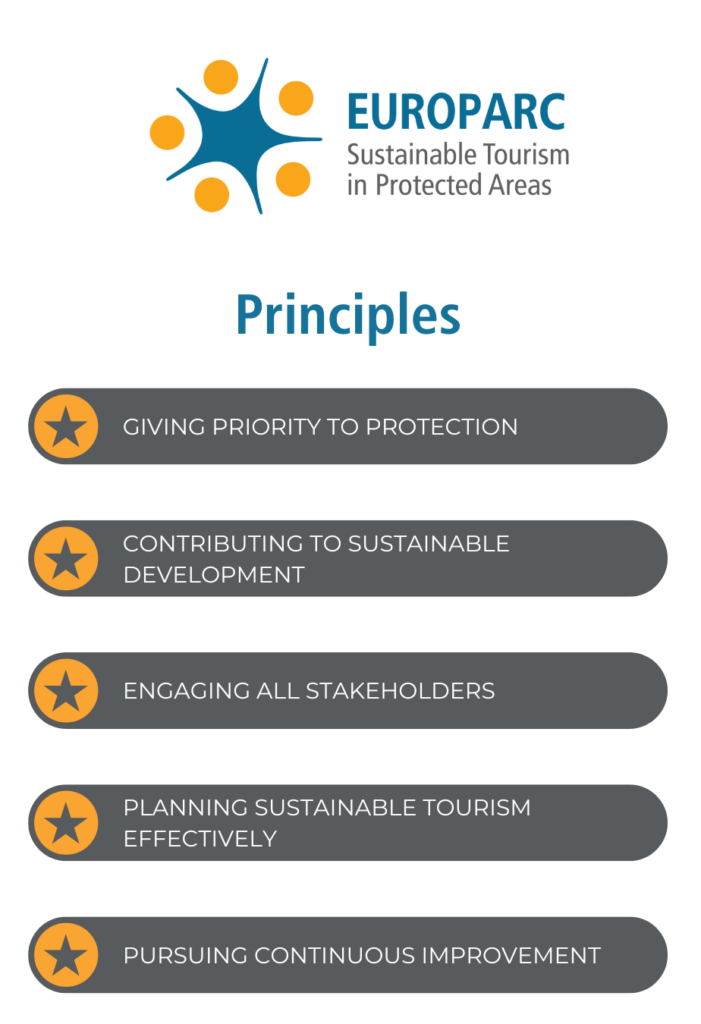 Whether repairing mountain paths, re-locating rare twin-flower or engaging with visitors about responsible access, the Cairngorms National Park Junior Rangers help to ensure a viable and healthy future for people and nature, and directly contributing to the Principles of the European Charter for Sustainable Development.
Whether repairing mountain paths, re-locating rare twin-flower or engaging with visitors about responsible access, the Cairngorms National Park Junior Rangers help to ensure a viable and healthy future for people and nature, and directly contributing to the Principles of the European Charter for Sustainable Development.
Earlier this year, four of them hiked up into the mountain plateau at the heart of the Cairngorms to deliver montane willow species to revitalise the remnant populations and increase the extremely rare montane scrub habitat. They were the youngest volunteers amongst a group organised by the Cairngorms Connect Partnership. So not only did they help to protect and improve the environment for the future, they also added passionate youth voices to a conversation involving a variety of stakeholders.
Katherine, aged 16, described what being part of the Willow Walk meant for her. “It makes us, as in the youth, feel like we’re doing something and we’re not just sitting round doing nothing. There is that sense of belonging. Being able to conserve and guarantee a future of this place for future generations makes me very happy. Doing small things to help, like bringing in the trees today, will help towards the bigger picture.”
Is your Protected Area a part of the European Charter for Sustainable Tourism?
Perhaps consider starting a Junior Ranger Programme to complement it.
Find out more on our website or send us an email!
